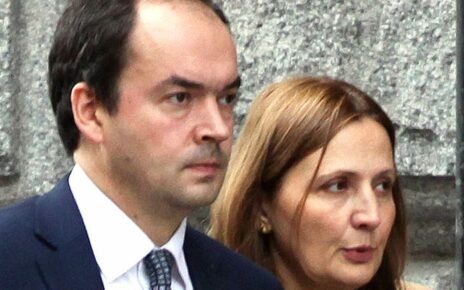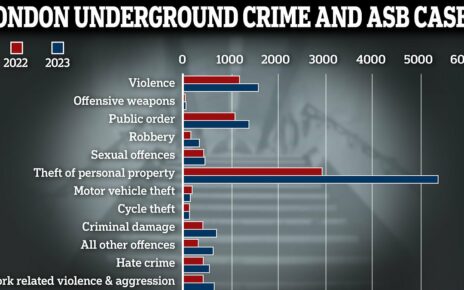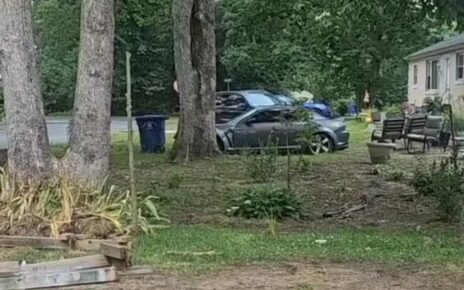Russian officer is ‘blown up by drone while mowing his lawn on his day off’ near Ukrainian border
- Alexei Chernykh was deputy chief of a local branch of the anti-corruption police
- Local reports say he lived in Schetinovka
A Russian officer has been killed while mowing his lawn on his day off in a settlement near the Ukrainian border, local reports have said.
Alexei Chernykh, deputy chief of a local branch of the anti-corruption police, was blown up by a drone at his home in the village of Schetinovka, they claimed.
The village is found just one mile from Russia’s border with Ukraine in the Belgorod Oblast, which has come under frequent drone strikes in recent months as Ukraine has stepped up its cross-border attacks.
Telegram channel Baza, which has known ties to Russian security services, said a drone dropped a bomb onto Chernykh’s property on Sunday.
‘A Ukrainian drone dropped ammunition on his site in Shchetynovka,’ the Telegram channel reported. ‘At that moment, Alexey was on his day off and was mowing [his] lawn,’ it added, saying that he was killed in the incident.
Alexei Chernykh (pictured right), deputy chief of a local branch of the anti-corruption police, was blown up by a drone at his home in the village of Schetinovka, they said
The police lieutenant colonel would have turned 40 today, according to information on his social media account.
READ MORE: Putin suffers his worst night of bombardment since invading Ukraine
Belgorod Governor Vyacheslav Gladkov accused Ukraine of being behind a drone strike in the region on the same day, saying that it had killed a ‘civilian’.
He accused Ukraine of dropping ‘an explosive device from a drone’ which hit a civilian who was ‘at his summer cottage mowing the grass’ at the time.
Gladkov said the man died from shrapnel wounds.
He did not name the person killed in the attack.
Ukraine, which has yet to achieve a major success in its summer ground counteroffensive, has struck deep into Russia in recent months, including an attack on the Kremlin in May and numerous drone attacks on civilian targets in Moscow.
Ukraine typically does not comment on who is behind attacks on Russian territory, although officials have publicly expressed satisfaction over them.
If Chernykh’s death is confirmed, he would become the latest high-ranking Russian official to meet his end since Vladimir Putin launched the invasion of Ukraine.
At least six generals have been confirmed by Russian sources to have been killed since February 2022 (including four which held the rank of Major General and two Lieutenant Generals), with Ukraine claiming the true figure to be 15.
Either way, the number of Russian generals killed in the conflict is unprecedented since the Second World War.
The tally has been attributed to senior commanders personally going into the field to address command difficulties, the faltering performances of Russian forces on the frontlines, insecure communications and US intelligence gathering.
Just last month, Lieutenant-General Oleg Tsokov, 51, was killed in a strike believed to have been carried out using a British-supplied storm shadow missile.
Tsokov was personally known to Putin and had been sanctioned by Britain and the EU for his role in the war against Ukraine.
News of Chernykh’s reported death came as Ukraine said Wednesday it had downed more than two dozen cruise missiles and a swarm of attack drones across the country in the ‘most powerful’ aerial attack on Kyiv in weeks that left two dead.
The assault came as Russia said Pskov airport near the border with NATO member Estonia had been targeted by drones, and state news agencies reported several transport planes were damaged.
Russian officials also described attacks on targets in the Bryansk, Kaluga, Orlov, Ryazan and Moscow regions.
The Russian foreign ministry said the attacks would ‘not go unpunished’ and could not have reached so far into Russian territory without Western help.
The attack on Pskov airport, more than 400 miles from the border with Ukraine, marks the latest strike deep inside Russian territory since Kyiv vowed to ‘return’ the conflict to Russia in July.
Source: Read Full Article




